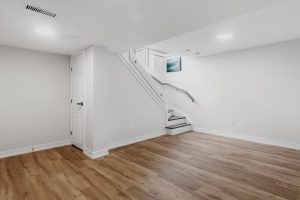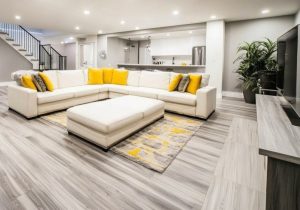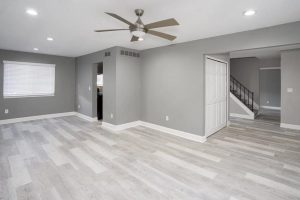Today, the cost of renovating a basement often falls between $34,000 and $100,000, depending on size, finishes, and complexity. But many homeowners still wonder, how much does it cost to renovate a basement and often underestimate what it takes to transform an unfinished space into a functional, comfortable area. Misjudging these costs can cause unexpected delays and budget overruns. A clear understanding of what influences renovation pricing—like square footage, layout goals, and hidden factors such as permits and moisture control—is key to planning a smooth, cost-effective project.
Renovation Cost by Basement Size
Size plays a central role in shaping your total renovation cost. From compact dens to sprawling rec rooms, the larger the space, the more you’ll pay for materials and labor. For a basic finish, prices start around $9 to $30 per square foot, while high-end projects with premium upgrades can climb beyond $160 per square foot.
Small basements (under 700 sq ft)
Small spaces offer great value and typically cost between $8,500 and $21,500. Popular layouts for compact basements include guest bedrooms, hobby rooms, and home offices. Here’s what you might spend by size:
- 400 sq ft: $3,700–$12,000
- 500 sq ft: $4,600–$15,000
- 700 sq ft: $6,500–$21,400
Even with a smaller footprint, a thoughtfully planned renovation can deliver big lifestyle benefits. Since materials like drywall and flooring are priced by area, smaller basements naturally help keep costs down. When asking how much does it cost to renovate a basement, size is one of the first factors to consider.
Medium basements (700–1,500 sq ft)
Mid-sized basements strike a balance between space and cost, generally ranging from $22,500 to $31,500 for a full renovation. These spaces work well for multipurpose layouts like home theaters, game rooms, or even compact in-law suites. Approximate costs by size include:
- 800 sq ft: $7,500–$24,000
- 1,000 sq ft: $9,400–$30,500
- 1,200 sq ft: $11,200–$36,600
Many homeowners treat the 1,000 square foot mark as a baseline for estimating renovation costs. This size supports a wide range of uses without the high price tag of oversized projects. It also reflects national averages for finished basement dimensions.
Large basements (1,500+ sq ft)
Larger basements unlock more potential but come with significantly higher renovation costs. Expect to pay between $28,000 and $45,500 for basements sized between 1,500 and 2,000 square feet. Expansive layouts over 2,000 sq ft may cost $40,000 to $100,000 or more.
Here’s how pricing scales by size:
- 1,500 sq ft: $14,500–$47,000
- 2,000 sq ft: $19,000–$62,500
With this much space, it’s feasible to build multiple rooms—like a home gym, kitchenette, and guest suite—all within one project. Labor often accounts for 20–40% of total costs, and regional pricing variations can add to the final total. If you’re wondering how much does it cost to renovate a basement that is fully unfinished, expect additional expenses compared to updating an already partially completed space.

Renovation Costs by Project Type
The specific kind of renovation you undertake dramatically shapes your budget. Whether adding functional living areas or entertainment features, each project carries unique costs and considerations.
– Adding a Bedroom
Converting part of your basement into a bedroom is often the most budget-friendly option. For a basement that’s already somewhat finished, this typically costs around $4,000. This price usually includes framing, drywall, basic electrical work, and finishing details. However, safety regulations require egress windows, which add $3,300 to $9,200 per window. Proper ventilation and HVAC extensions are also essential and can cost between $4,000 and $13,000 to maintain comfort and air quality.
– Installing a Bathroom
Adding a bathroom increases both usability and expense. Renovation costs for a basement bathroom usually fall between $12,000 and $21,500, depending on size and fixtures. For basic installations, expect to pay approximately:
- Toilet: $530–$1,050
- Sink: $530–$1,300
- Shower: $2,000–$8,700
- Bathtub: $4,000–$9,000
The presence of existing plumbing nearby greatly reduces costs. If your basement lies below the main sewer line, installing a sewage ejector pump will add roughly $1,300 to $4,000 to your project.
Creating a Home Theater or Gym
Transforming your basement into an entertainment hub can be as simple or elaborate as you like, with costs varying accordingly. A basic home theater setup—with a standard projector and sound system—typically costs around $13,000. Mid-range options, featuring 4K projectors and advanced sound equipment, generally run between $26,000 and $39,000. For those wanting a luxury experience with professional-grade gear and custom features, expenses often exceed $52,000.
Alternatively, a home gym can be a practical and affordable addition. Most homeowners spend between $2,600 and $6,500 setting up a functional workout area. Basic equipment like weights and resistance bands costs around $650 to $1,300, while specialized flooring runs $400 to $800, providing cushioning and durability.
Building a Basement Bar or Kitchenette
A basement bar adds a stylish entertainment element and usually costs between $1,000 and $29,500, with the average hovering near $10,500. Pricing is often calculated per linear foot, ranging from $130 to $2,000.
Wet bars with plumbing require additional expenses: sink installation adds roughly $260 to $1,300, and plumbing lines can cost between $400 and $2,300. Kitchenettes, which are more elaborate and functional, command higher budgets—typically around $21,000, with a range of $13,000 to $26,000 depending on appliances and finishes.
Turning Your Basement Into a Full Apartment
Converting a basement into a complete apartment is the most extensive type of renovation. These projects usually cost between $65,000 and $100,000, involving professional design, full plumbing, electrical systems, and the creation of multiple rooms.
Typical expenses include:
- Kitchen rough-in: about $5,200
- Full bathroom installation: $7,800–$19,500
- Kitchen installation: $1,300–$26,000
- Proper egress windows or doors: around $5,500
While this is a significant investment, many homeowners find it worthwhile. It can add substantial value to your property, and rental income from a finished basement apartment often helps offset initial costs over time. This is an important consideration when calculating how much does it cost to renovate a basement for maximum value.

Key Factors That Impact Renovation Costs
Several elements drive the overall price of finishing your basement, and understanding them helps you prepare an accurate budget.
Labor makes up a large portion of your renovation expenses, typically between 20% and 40% of the total cost. General contractors who oversee the project usually charge 10% to 25% of the total, or hourly rates from $65 to $195. Specialist rates vary, with architects and engineers charging between $130 and $325 per hour, and plumbers between $60 and $260 per hour. Electricians usually charge per task rather than hourly.
Permits ensure your project meets building codes and cost between $650 and $2,600. Multiple inspections during construction add time and expense but are essential for compliance and safety.
Waterproofing and Mold Removal
Before starting any finishing work, waterproofing your basement is crucial to prevent moisture problems. This preventive step costs around $7 to $14 per square foot, with whole-basement waterproofing averaging about $5,800. If you already have moisture issues, professional mold removal ranges from $2,000 to $11,500, though smaller problems may be resolved for $650 to $1,300. Ignoring these issues can lead to costly structural repairs, which typically run between $2,600 and $9,200.
Insulation, Drywall, and Flooring
Good insulation controls temperature, moisture, and sound in your renovated basement. Insulation prices range from $1.30 to $6.50 per square foot depending on the material, with spray foam being the priciest but most effective option. Wall framing generally costs between $5 and $13 per square foot, and drywall installation adds roughly $2 to $4.50 per square foot. Flooring is a significant expense, and hiring professionals for floor installation ensures lasting quality. Typical flooring cost ranges include:
- Vinyl flooring: $1.30 to $6.50 per square foot
- Carpet: $4 to $13 per square foot
- Hardwood: $7.50 to $23 per square foot
Electrical and Plumbing Upgrades
Electrical work averages about $7,000 but can reach much higher for specialized setups like home theaters. Common tasks include adding outlets ($130 to $585 each), installing light switches ($80 to $390 each), and adding light fixtures ($195 to $1,170 each).
Plumbing costs vary widely, especially if adding bathrooms or kitchenettes. Licensed plumbers charge between $60 and $260 per hour, with total plumbing costs ranging from $3,250 to $19,500 for most basement projects.
DIY vs. Hiring a Professional: What’s More Cost-Effective?
Deciding whether to finish your basement yourself or hire professionals depends on balancing cost savings with time investment and quality.
DIY is financially smart for simple tasks that don’t need specialized skills or permits. For example, painting walls yourself can save about $1.30 to $3.90 per square foot compared to hiring pros. Installing laminate flooring DIY costs roughly $3.90 to $9 per square foot, versus $13 to $16 per square foot for professional installation.
DIY works best if you:
- Have renovation experience
- Own basic tools
- Can commit plenty of time (often 2-3 times longer than pros)
- Are tackling mainly cosmetic work
Electrical work should always be done by licensed electricians due to safety and code compliance. Plumbing, foundation repairs, and complex framing also require experts. Professionals bring licensing, insurance, code knowledge, and proper tools.
Cost Comparison: DIY vs. Pro
On average, DIY finishing costs 30-50% less than hiring professionals. For a 1,000-square-foot basement, professional finishing usually runs $19,500 to $39,000, while DIY material costs might be $9,750 to $19,500. The trade-off lies in time and quality. Professionals typically complete projects in 2 to 6 weeks, whereas DIY can stretch 3 to 6 months. Professionals also often provide warranties, unlike DIY.
Many homeowners choose a hybrid approach—DIY for simple tasks like painting and trim work, while hiring pros for electrical, plumbing, and structural work—saving 15-25% compared to full professional service without compromising critical elements.

How Much Value Does a Finished Basement Add?
Investing in a basement renovation isn’t just about extra space—it can also boost your property’s market value. Understanding this financial return helps you decide if the upfront costs make sense.
Finishing a basement typically returns about 70% of what you spend, meaning you might recoup roughly $7 for every $10 invested. This ROI is higher than many other home improvement projects, including kitchen and bathroom remodels. Basement conversions often deliver around an 85% return, making them among the top interior renovations for value recovery. For example, a $41,500 basement finishing project could add about $29,000 to your home’s value.
Location significantly affects potential returns:
- Coastal and western regions: up to 86% ROI
- National average: 70-75% ROI
- Northeast: 50-80% ROI
A finished basement can increase your home’s overall value by around 10%. Spaces that offer flexibility—like home offices, rental suites, or multigenerational living areas—command premium value in today’s market. This is a crucial factor when weighing how much does it cost to renovate a basement against potential long-term gains.
What Appraisers Consider
Appraisers usually value finished basement space at 50-70% of the price per square foot of above-ground living areas. For instance, if main floor space sells for $260 per square foot, a finished basement might add $130 to $180 per square foot.
Factors that enhance value include:
- Walkout access
- Quality of materials and finishes
- Proper egress windows and separate entrances
- Compliance with permits and codes
Besides financial return, finished basements offer lifestyle benefits—extra rooms for families, guest suites, or work-from-home areas—that often justify the investment beyond pure dollars.
Summary
Renovating a basement is a major investment that requires thoughtful planning. Costs vary based on size, materials, and project complexity. Smaller basements cost less, while large, fully transformed spaces require much more. The project type also influences the budget—simple additions cost less than full conversions. Labor, permits, and essential upgrades like waterproofing and electrical work add to the final price. Before starting, research contractors, gather quotes, and include a contingency fund. Asking how much does it cost to renovate a basement and understanding these factors helps ensure your project is successful. A well-planned renovation turns unused space into one of your home’s most valuable areas.
